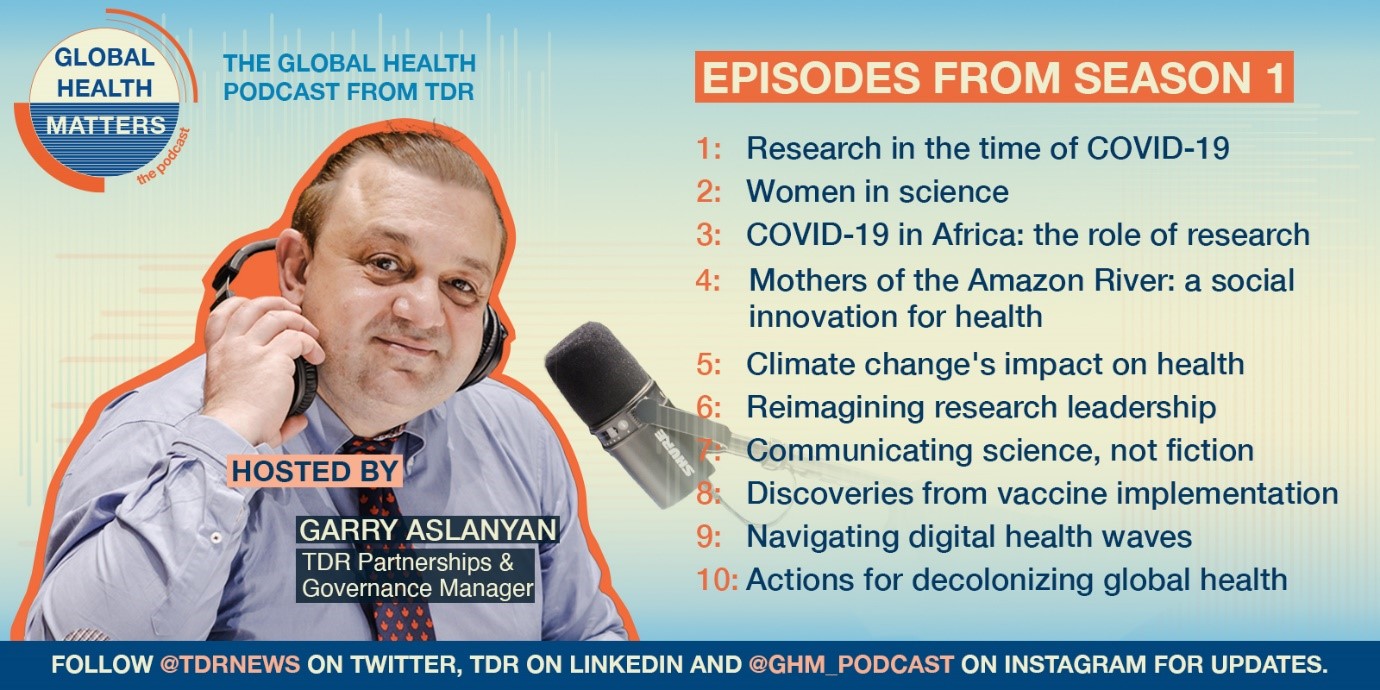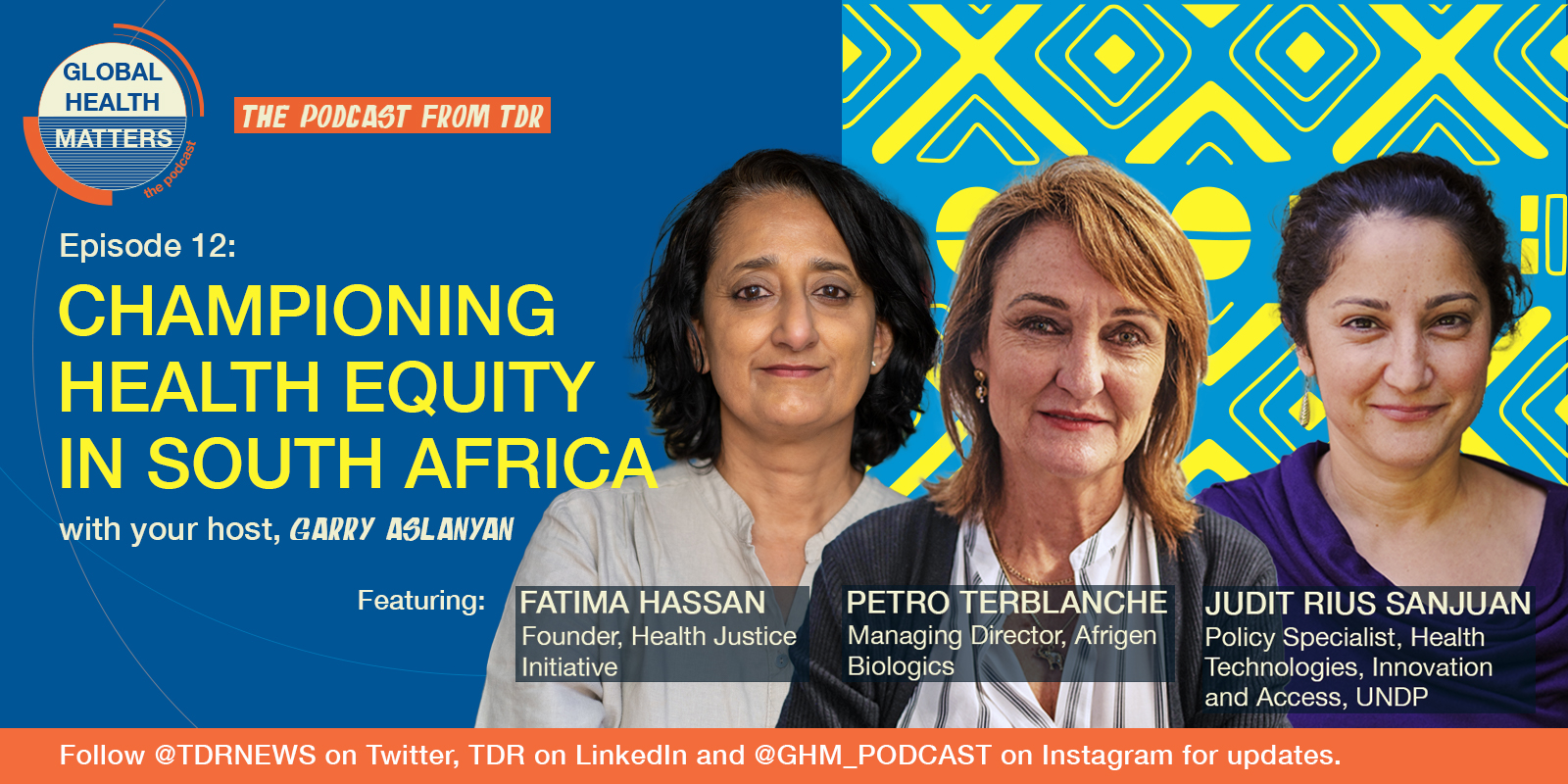The Global Health Matters podcast, launched in 2021, provides a forum for discussing the most important health topics of the day, with a focus on sharing perspectives from low- and middle-income countries. It is produced by TDR, the Special Programme for Research and Training in Tropical Diseases, an infectious diseases research programme hosted at WHO. Season 2 launched on 12 April, and you can listen to the monthly podcast directly through the TDR website or subscribe through your preferred podcast platform.
The podcast is hosted by Dr Garry Aslanyan, Manager of Partnerships and Governance at TDR. The following is an interview conducted by TDR Communications Manager Makiko Kitamura, one of the producers of the podcast. This interview has been edited and condensed for length and clarity.

So Garry, tell us about yourself: What’s your background, and what led you to choose a career in public health?
I trained in dentistry, but quickly realized that I didn’t want to spend the rest of my life in somebody’s mouth. At this time, the late 1990s in Canada, where I’m from, there were a lot of health issues such as tobacco control, homelessness and the HIV/AIDS epidemic, which drew me to a career in public health. So I started volunteering for the Ontario Public Health Association, which was part of my training in health policy and systems. I then worked for the Canadian Government and moved to Geneva to support Canada’s relations with WHO, which then led to my current position at TDR.
What prompted you to start this podcast?
I’ve felt that public health tends to be siloed. For example, people who work in non-communicable diseases sometimes don’t know what’s happening in infectious diseases, and there needs to be more connections made with other sectors as well.
I’ve personally used podcasts as a way to keep up with developments in various areas, and I listened to one by Tenfold that was about “Why Public Health Should Do More Podcasting” - that was the first inspiration. When we looked more closely, we saw that there isn’t really a lot of global health podcasting going on, or many have come and gone quickly. I didn’t see any that were bringing voices and perspectives from low- and middle-income countries, and that is where we think we’re filling a gap. The pandemic was also a major impetus for this project. Pre-pandemic, I was traveling regularly to meet with various stakeholders, and the podcast platform provided an opportunity to do that virtually. It also erased geographic and time zone barriers to engaging in global conversations.
Tell us about setting up the podcast. What were some of the challenges and new skills that you had to bring in to produce the podcast?
I’ve never worked in radio, and there was a lot of learning that we all had to do. We had to procure the right recording equipment and find the right recording platform. There have been challenges in terms of guests’ internet connections in some countries, getting good quality audio and accommodating different time zones.
But actually, the timing may have been helpful because the pandemic had forced people to start using new communications tools. So by the time we reached out to Muna Abdi in Somaliland and Dissou Affolabi in Benin for our first episode on “ Research in the time of COVID-19,” they weren’t shocked that they would be using these remote interviewing tools.
Can you describe the team that you assembled and a bit about their roles?
Before starting the podcast we had to do a lot of research. We needed to find really good topics and match them with compelling guests. We needed to have someone who works on content production who was also a health expert. We were lucky to have found Lindi van Niekerk who was also interested in podcasting.
So, the production team in terms of the content is Lindi and of course Maki and myself. Then we have someone who has experience with recording and editing and all of the other technical aspects of the podcast. That’s Obadiah George. He’s the only one on our team who had any previous experience in podcasting. Izabela Suder-Dayao manages the podcast web pages on the TDR website, Christine Coze oversees transcripts of episodes and Elisabetta Dessi is responsible for all podcast-related contracts. We’ve also engaged graphic designers and social media experts to help promote the episodes.
What makes a good episode and what has been your personal favourite from Season 1?
I think what makes a good episode is a topic that grabs the listener, having a really good discussion with the guests and between the guests as well. And perhaps most importantly, a good episode inspires the listener – someone in Brazil might learn from a speaker in the Philippines who says something relevant and useful for their own work.
The episode on COVID-19 in Africa was an interesting topic because there was very little being said about how previous outbreaks such as Ebola and H1N1; pandemics like HIV, TB and malaria; and polio eradication really helped Africa to deal with this differently. I think our episode unpacked that to those who had not worked in African public health systems, especially to people in high-income countries who may not have understood the swift and organized response to this disease.
What topics will be covered in Season 2, and how did you select them?
In Season 2 we’ve been a bit more systematic in the way we have selected topics. We had suggestions from our listeners emailing us topics they felt were important, and a research journalist scanned scientific literature, news and other sources to see what the hot topics people are discussing in global health.
Access to medicines and vaccines is a topic that is not new, but even in the process of producing this episode, we’ve had a tremendous change in overall global policy and discourse, from discussions at the WTO such as waiving IP rights to COVID-19 vaccines, to the establishment of a technology hub for LMICs in South Africa, that were not on the table even a year ago. Science diplomacy, corruption in health, migration and health, and diversity in global health are some of the other topics that will be addressed in Season 2.
What key lessons have you learned that you can pass on to others about producing a podcast?
I think the key lesson is not to get discouraged as it takes time to build an audience. Fortunately, we reached 10,000 downloads in Season 1, reaching people in more than 130 countries.
Sometimes I look at the analytics data showing the people listening to the podcast, and I think, my gosh, who are these eight people in that small city in Yemen who listened to me? I have no idea who they are, but they are there, in a place I don’t know, and I imagine they are probably working in public health. And I think, oh my, this is really global. So as I know that these people heard my voice there, I say to myself that I’m going to do this as much as possible.
For more information on the podcast, please contact Dr Garry Aslanyan.


